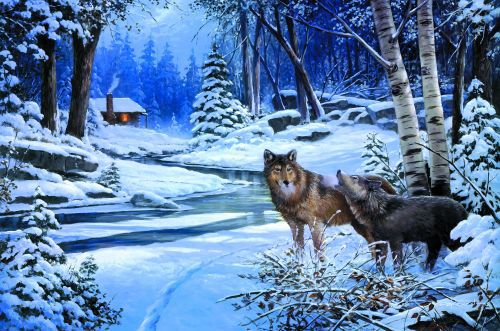| 正面 | 4184.wolf 英 [wʊlf]美 [wʊlf]     |
|---|---|
| 背面 |      释义: 2. Wolf Totem:狼图腾。n. 狼;色狼;残忍贪婪之人vt. 大吃;狼吞虎咽地吃n. (Wolf)人名;(以、捷、芬、瑞典、德、匈、法、罗、荷、英)沃尔夫 例句: 1. Her dancing brought loud cheers, wolf whistles and applause.她的舞蹈赢来震耳的欢呼声、口哨声和掌声。 wolf 狼来自PIE*wlkwo,狼,可能来自拟声词,词源同lupine,lupin,werewolf. wolfwolf: [OE] Wolf is an ancient word, which has been traced back to Indo-European *wlqwos. This, or its variant *lukwos, also produced Greek lúkos (source of English lycanthropy ‘(delusion of) turning into a wolf’ [16]), Latin lupus (source of French loup, Italian lupo, and Spanish lobo, and probably also of English lupin [14]), Sanskrit vrkas, Russian volk, Polish wilk, Czech vlk, Serbo-Croat vuk, Lithuanian vilkas, Latvian vilks, Albanian u’lk, and Armenian gail. In prehistoric Germanic it gave *wulfaz, which has evolved into German, Dutch, and English wolf and Swedish and Danish ulv.=> lupin, lycanthropywolf (n.)Old English wulf "wolf, wolfish person, devil," from Proto-Germanic *wulfaz (cognates: Old Saxon wulf, Old Norse ulfr, Old Frisian, Dutch, Old High German, German wolf, Gothic wulfs), from PIE root *wlkwo- "wolf" (cognates: Sanskrit vrkas, Avestan vehrka-; Albanian ul'k; Old Church Slavonic vluku; Russian volcica; Lithuanian vilkas "wolf;" Old Persian Varkana- "Hyrcania," district southeast of the Caspian Sea, literally "wolf-land;" probably also Greek lykos, Latin lupus). This manne can litle skyl ... to saue himself harmlesse from the perilous accidentes of this world, keping ye wulf from the doore (as they cal it). ["The Institution of a Gentleman," 1555] Probably extinct in England from the end of the 15th century; in Scotland from the early 18th. Wolves as a symbol of lust are ancient, such as Roman slang lupa "whore," literally "she-wolf" (preserved in Spanish loba, Italian lupa, French louve). The equation of "wolf" and "prostitute, sexually voracious female" persisted into 12c., but by Elizabethan times wolves had become primarily symbolic of male lust. The specific use of wolf for "sexually aggressive male" first recorded 1847; wolf-whistle attested by 1945, American English, at first associated with sailors. The image of a wolf in sheep's skin is attested from c. 1400. See here for a discussion of "wolf" in Indo-European history. The wolf-spider so called for prowling and leaping on its prey rather than waiting in a web.wolf (v.)"eat like a wolf," 1862, from wolf (n.). Related: Wolfed; wolfing." |